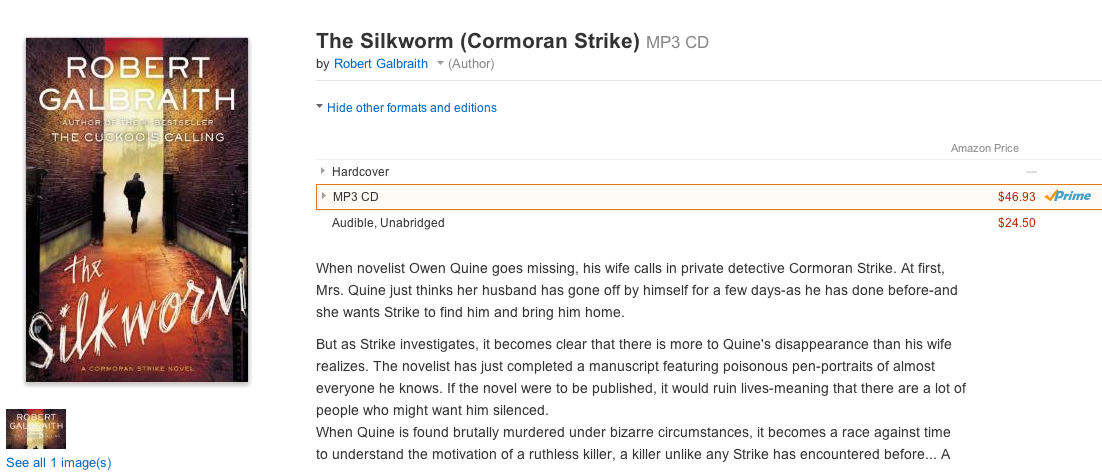Amazon Is Only Hurting Itself In Standoffs With Book, Movie Companies

The only way to currently purchase J.K. Rowling’s upcoming book (written under the pen name Robert Galbraith) is to pre-order the audio book versions of the title.
In addition to its headline-making standoff with Hachette Book Group — which has resulted in delays and shortages of existing titles and the inability to order upcoming books like J.K. Rowling’s new book — Amazon is currently embroiled in a showdown with Warner Home Video.
As the NY Times’ Bits blog points out, this means that highly anticipated DVD/Blu-ray releases like The LEGO Movie are not available for purchase on the site; an attempt by Amazon to deprive Warner of revenue and compel it to the bargaining table.
Amazon presumably doesn’t care that much about missing out on the money it could be making off these items, as it has millions of other books and movies — not to mention appliances, music, food, tools, and mini-tanks — that it can still sell.
But there are ways that Amazon’s hubris could come back to kick the company in the derriere.
1. Losing the Loss-Leaders
Amazon has always done a good business of using paper-thin margins on book and movie sales as a way to get people on the site and looking around for other things to buy.
So think of the many thousands of customers who will come to the site looking to buy The LEGO Movie, only to find they can’t order it on Amazon. What is the likelihood that many of these customers will then go “Oh, while I’m here I might as well buy some full-price video games and a dishwasher”?
2. Bad Word-of-Mouth
The Amazon disputes have begun making headlines, and millions of people are sharing these mostly negative stories on Facebook, Twitter and elsewhere. Some shoppers aren’t even looking at Amazon for the affected books and movies, meaning they aren’t seeing that third-party marketplace sellers sometimes have them for sale or that these titles are still available in e-book and digital download formats.
It also puts Amazon in the position of being viewed in the same light as the large bricks-and-mortar retail industry that it has spent nearly two decades trying to disrupt. One has come to expect that Walmart would cut off a publisher’s access to Walmart shoppers in order to force a better deal for itself, but Amazon has generally been the place you can get just about anything at any time; removing high profile products from its virtual shelves just highlights that it is ultimately no different from any of its competition.
3. Overestimating Amazon’s Importance
There’s a reason why strong-arm efforts from big box stores like Walmart are more effective than Amazon’s attempts to force better pricing for itself, and it boils down to the difference between one-stop shopping online and in the real world.
When Walmart decides to not carry a book, it means that all those shoppers who do one-stop shopping at the store — getting groceries, some clothing, housewares and some entertainment — will have to physically go to another store to get that book. That’s a pretty substantial impediment, especially once you’ve got your car loaded up with perishable food.
The Internet offers the experience of one-stop shopping, even if it means having to shop at a few different stores. If someone goes to Amazon and can’t find a book or movie, there are countless other online retailers — including those run by the big box stores — that are selling what the customer wants. So yes, it requires putting in your payment details on a second site, but it doesn’t require the time and effort of driving to a second store, parking, waiting in line, etc.
J.K. Rowling’s new book will still sell a huge number of copies. DVDs of The LEGO Movie will still make their ways into the homes of those who want it. The people that will be hurt the most are the smaller titles that rely on impulse purchases from Amazon shoppers, which does nothing to help the negative publicity for the e-tailer.
4. Aiding the Competition
While we know plenty of people who consider themselves fans of Amazon, even these shoppers aren’t going to not buy a book or movie they want just because they like the website.
Walmart and others have already jumped on the ongoing disputes in an effort to lure customers who can’t find what they’re looking for on Amazon. And some of the customers that take this bait will continue to do their shopping at someplace other than Amazon.
It’s a huge risk for a retail operation to let customers get a taste of the competition. Sure, the experience might be so bad that they come running back, but some will inevitably be lost.
Jeff Bezos should ask the folks at Time Warner Cable how well their 2013 standoff with CBS went. TWC thought it could blackout CBS and CBS-owned stations in major markets like L.A. and New York City in order to win a better deal on the fees it pays to the broadcaster.
But what TWC didn’t realize is that CBS had the product that people want — TWC is just a way to obtain that product. The standoff ended after a month and the cable company lost hundreds of thousands of customers (in markets where it has no competition) and it still had to pay exorbitant fees to CBS.
Amazon is not very different from TWC in its current disputes. Amazon is just one of many ways to buy a book or movie, and the company is only making that fact more apparent by continuing to put up roadblocks to content that consumers want.
Want more consumer news? Visit our parent organization, Consumer Reports, for the latest on scams, recalls, and other consumer issues.

